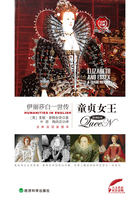

Someone says, love is just the continuous quarrel. In fact, after each quarrel between the lovers, the sky of love is subtly changed. They often love each other more and more. But the Queen's love was not so.
1. Another Dangerous Handsome Man
The summer idyll passed smoothly on, until, in the hot days of July, there was a thunderstorm. While the Earl conversed with the Queen in her chamber, the Captain of the Guard stood outside the door on duty; and the Captain of the Guard was a gentleman with a bold face—Sir Walter Raleigh. The younger son of a West-country squire, the royal favour had raised him in a few years to wealth and power: patents and monopolies had been showered upon him; he had become the master of great estates in England and Ireland; he was warden of the stannaries, Lord-Lieutenant of Cornwall, a Knight, a Vice-Admiral; he was thirty-five—a dangerous and magnificent man. His splendid bearing, his enterprising spirit, which had brought him to this unexpected grandeur—whither would they lead him in the end? The Fates had woven for him a skein of mingled light and darkness;fortune and misfortune, in equal measure and in strange intensity, were to be his.
2. The Lover's Fight Is for Love
The first stroke of the ill-luck that haunted his life had been the appearance at Court of the youthful Essex. Just as Raleigh must have thought that the Queen's fancy was becoming fixed upon him, just as the decay of Leicester seemed to open the way to a tri umphant future—at that very moment the old favourite's stepson had come upon the scene with his boyish fascinations and swept Elizabeth off her feet. Raleigh suddenly found himself in the position of a once all-conquering beauty, whose charms are on the wane. The Queen might fling him three or four estates of beheaded conspirators, might give him leave to plant a colony in America, might even snuff at his tobacco and bite a potato with a wry face—all that was nothing: her heart, her person, were with Essex, on the other side of the door. He knotted his black eyebrows, and determined not to sink without a struggle. During a country visit at Lord Warwick's, he succeeded in disturbing Elizabeth's mind. Lady Warwick was a friend of Essex's sister, Lady Dorothy Perrott, who, owing to a clandestine marriage, had been forbidden to appear at Court, and the rash hostess, believing that the Queen's anger had abated, had invited Lady Dorothy, as well as her brother, to the house. Raleigh told Elizabeth that Lady Dorothy's presence was a sign of deliberate disrespect on the part of Essex; whereupon Elizabeth ordered Lady Dorothy to keep to her room. Essex understood what had happened and did not hesitate. After supper, alone with the Queen and Lady Warwick, he made a vehement expostulation, defended his sister, and declared (as he told a friend, in a letter written immediately afterwards), that Elizabeth had acted as she did “only to please that knave Raleigh, for whose sake I saw she would both grieve me and my love, and disgrace me in the eye of the world.”Elizabeth, no less vehemently, replied. “It seemed she could not well endure anything to be spoken against Raleigh and taking hold of one word, disdain, she said there was no such cause why I should disdain him.”This speech “did trouble me so much, that, as near as I could, I did describe unto her what he had been and what he was.”The daring youth went further.“What comfort can I have, ”he exclaimed, “to give myself over to the service of a mistress that is in awe of such a man? ”All this time the Captain of the Guard was at his post. “I spake, what of grief and choler, as much against him as I could, and I think he, standing at the door, might very well hear the worst that I spoke of himself.”But his high words were useless; the dispute grew sharper; and when the Queen, from defending Raleigh, went on to attack Essex's mother, Lady Leicester, whom she particularly disliked, the young man would hear no more. He would send his sister away, he said, though it was almost midnight, and “for myself, ”he told the agitated Elizabeth, “I had no joy to be in any place, but loth to be near about her, when I knew my affection so much thrown down, and such a wretch as Raleigh so highly es-teemed of her.”To this the Queen made no answer, “but turned her away to my Lady Warwick, ”and Essex, flinging from the room, first despatched his sister from the house under an escort of armed retainers and then rode off himself to Margate, determined to cross the Channel and take a part in the Dutch war. “If I return, ”he wrote, “I will be welcomed home; if not, una bella morire is better than a disquiet life.”But the Queen was too quick for him. Robert Carey, sent galloping after him, found him before he had taken ship and brought him back to her Majesty. There was a reconciliation; the royal favour blazed forth again; and within a month or two Essex was Master of the Horse and Knight of the Garter.
3. The New Detection from the Quarrel
Yet, though the cloud had vanished, the sky was subtly changed. A first quarrel is always an ominous thing. In the curious scene at Lord Warwick's, under the cover of jealousy and wounded affection, a suppressed distrust, almost a latent hostility, had, for a moment, come to the surface. And there was more; Essex had discovered that, young as he was, he could upbraid the great Queen with impunity. Elizabeth had been angry, disagreeable, and unyielding in her defence of Raleigh, but she had not ordered those audacious protestations to stop; it had almost seemed that she liked them.